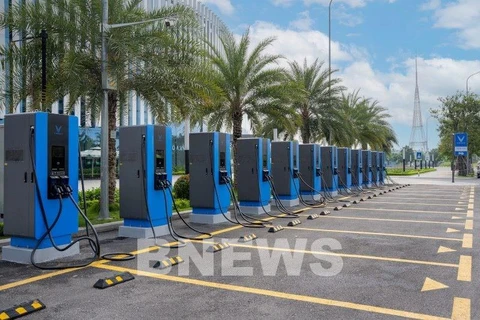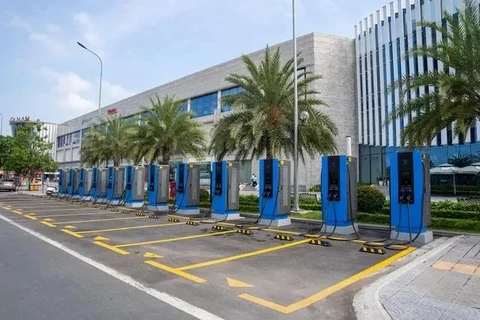
Hanoi (VNA) - According to World Bank (WB) experts, Vietnam has an ambitious goal: by 2030, 50% of urban vehicles and 100% of buses and taxis will be electric or green energy-powered, with full electrification of all vehicles by 2050.
Vietnam is already the second-largest market for electric two-wheelers globally, after China. According to Bowen Wang, WB transport expert, electric two-wheelers will dominate Vietnam's market until 2035. Currently, they account for 12% of two-wheeler sales, and with supportive policies, the market could expand to 12-16 million units by 2035, representing 42-56% of total two-wheeler sales.
Vietnam’s electric two-wheeler market is diverse and dynamic, with numerous suppliers competing in terms of quality and price. Consumer acceptance of this segment is high, especially in urban areas, Wang further noted.
In the passenger car segment, Vietnam has a significant opportunity to leapfrog petrol and diesel vehicles, transitioning directly to electric vehicles (EVs).

Although car ownership remains a luxury for most Vietnamese, electric vehicles (EVs) have become an attractive alternative to petrol and diesel cars for those who can afford them.
It is projected that another decade will be neeeded for EVs to overtake two-wheelers and become the dominant mode of transport in Vietnam’s consumer market. During this period, EV prices are expected to become increasingly competitive compared to traditional cars due to significant efficiency improvements.
Public buses account for less than 10% of vehicles in Hanoi and Ho Chi Minh City. To meet the 2030 goal of 100% electric buses, Vietnam needs to replace 9,600 diesel buses and add 10,500 electric buses across its major cities.
Vietnam also needs to expand its electric grid capacity by 3-5% annually, potentially requiring up to 15% additional transmission capacity by 2050.

To mitigate the impact of electric vehicle usage on the power sector, Vietnam must enhance grid efficiency, optimise battery use, and promote shifts in passenger and freight transportation methods. Efforts should focus on encouraging EV charging at public stations during daytime off-peak hours whenever possible.
The WB estimates suggest investments of 9 billion USD by 2030 and 14 billion USD annually from 2031 to 2050 for electrical infrastructure upgrades.
The transition to EVs could save Vietnam up to 498 billion USD in oil imports by 2050, generate 6.5 million new manufacturing jobs, and significantly reduce air pollution costs by 30 million USD in 2030 and 6.4 billion USD in 2050.
Shigeyuki Sakaki, WB senior transport expert, emphasised that low-energy electric motorcycles will be widely adopted, but the grid must expand to support increased EV use. He recommended establishing an intergovernmental agency to coordinate the transition and achieve a 7.2% reduction in the transport sector's greenhouse gas emissions.
Transitioning to electric vehicles is a complex process requiring cross-sector collaboration, but it presents a transformative opportunity for Vietnam’s economic and environmental future./.






















